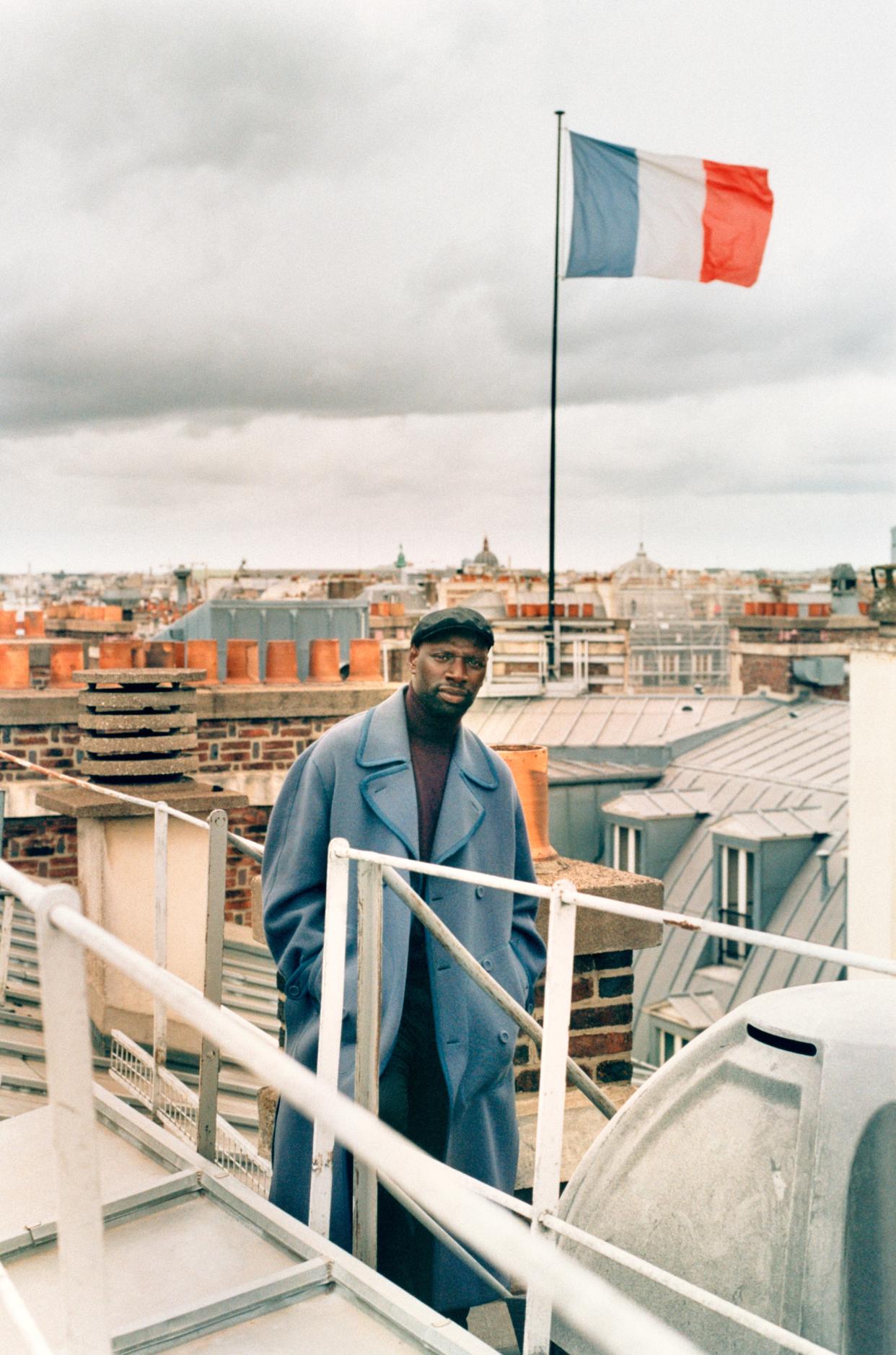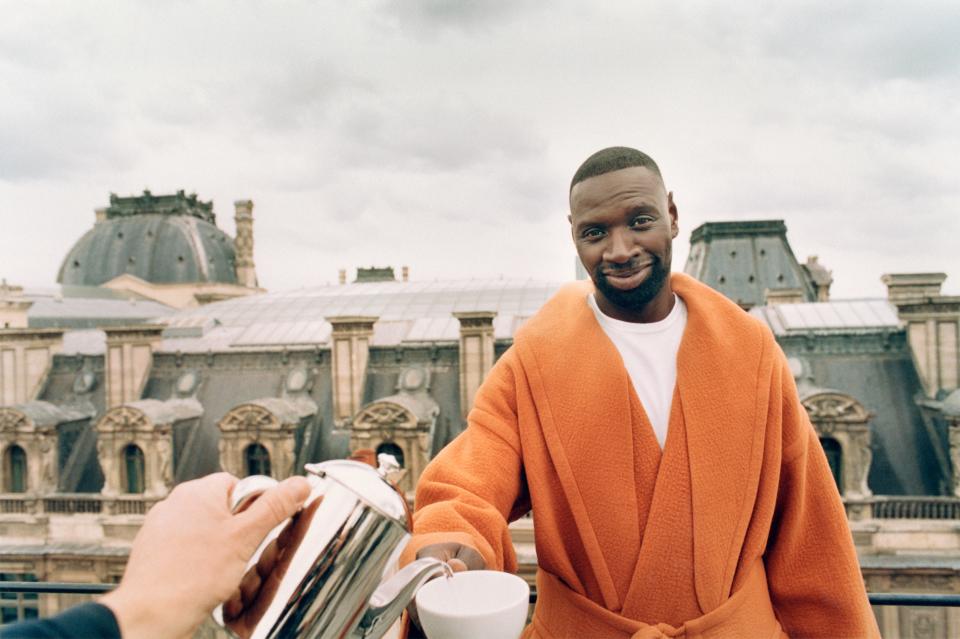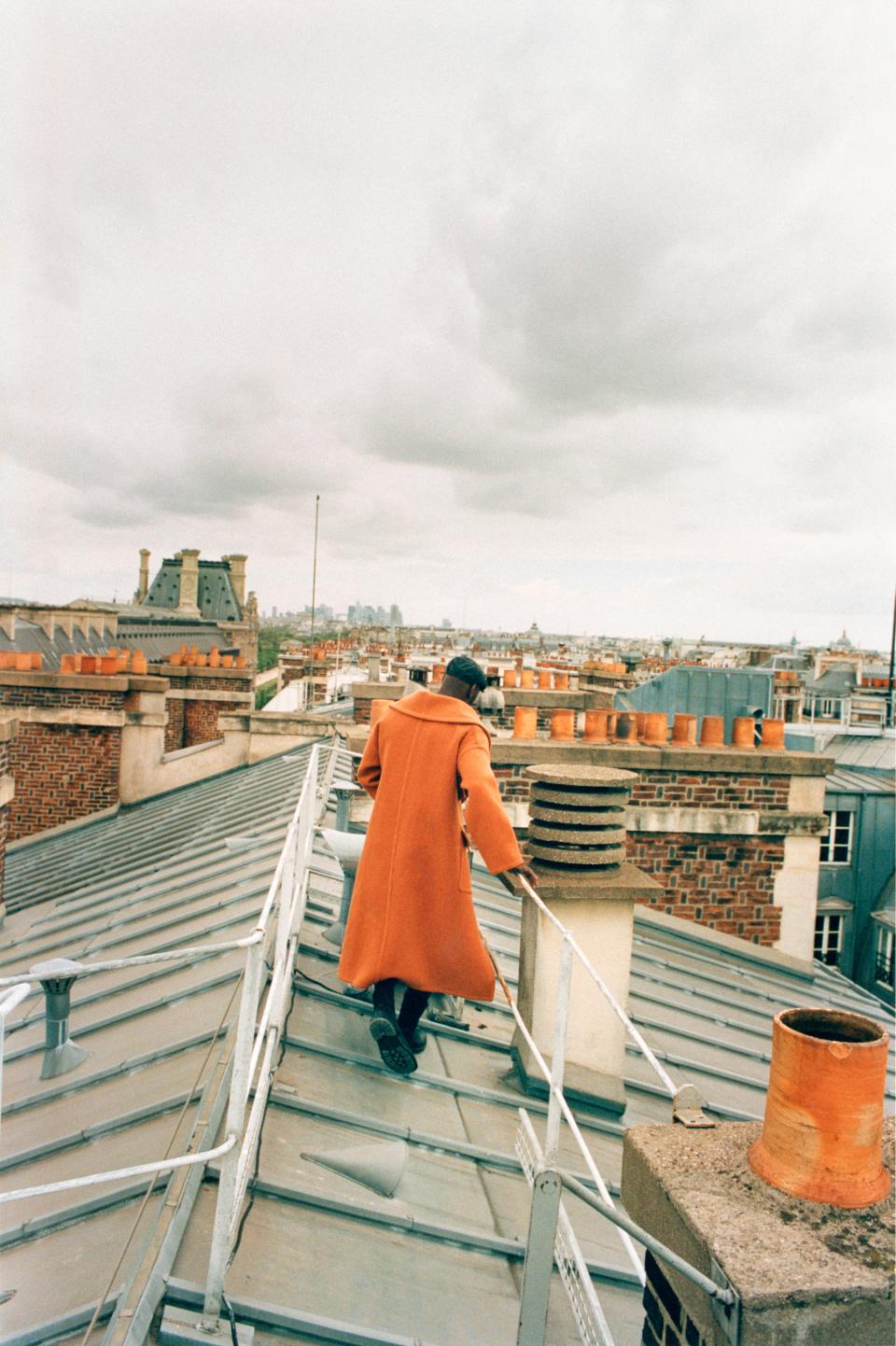How Lupin ’s Omar Sy Became An International TV Sensation

Sy, photographed in Paris, is easily the most beloved actor in France—even before his breakout role as Assane Diop in Lupin. Dior Men coat. Dolce & Gabbana sweater and cap. Boss pants. Hair, JAYR; makeup, Angloma. Fashion Editor: Michael Philouze.
- Oops!Something went wrong.Please try again later.
- Oops!Something went wrong.Please try again later.
“My sense of adventure comes from the place I grew up,” says Omar Sy, the star of Lupin—the Netflix series that has become an international phenomenon—and easily the most beloved actor in France. (Three times Sy has been voted France’s favorite person, on an open ballot.) The place he’s talking about is Trappes, one of the infamous banlieues about 20 miles west of Paris, which, collectively, occupy a complicated place in the French national imagination. Banlieues are suburbs outside major cities filled with housing projects that were cheaply constructed for immigrant workers during France’s postwar labor shortage. As jobs dried up in the 1980s and ’90s, austerity settled in and xenophobia flared, giving the banlieues a forbidding reputation, either to be pitied or shunned. “In Europe, city centers are for the rich,” explains Sy, the third of seven children born to a Senegalese father and Mauritanian mother. “The more outside you live, the more outside the bubble you are, and it’s hard to come in.”
But Sy was happy in Trappes, where soccer pitches opened onto pastures and forests, and his friends had immediate family from everywhere. “Mediterraneans, West Africans, Greek, Polish, Romanians,” Sy says. “I heard so many languages and tasted so much food! I’d go up to the fifth floor and be in Greece, downstairs in the Maghreb. It pushed me to have an open spirit.” It was a friend from the neighborhood, Jamel Debbouze, a comedian with a lunchtime show on the national station Radio Nova, who gave Sy his big break, inviting him on to impersonate a retired football star. (“I’d have loved to be a player,” says Sy, who was 19 at the time, “but I wasn’t any good.”) At the station he met the comedian Fred Testot, and soon the two became Omar et Fred, an improv and sketch-comedy duo who starred in a series of shorts on the national network Canal+. Minor comedic turns gave way, bit by bit, to meatier roles—anything the young actor, with his sparkling charisma and impeccable timing, could get.
France has no legal recognition of ethnicity, and cultural difference has historically been difficult to affirm, much less celebrate, without being seen as a threat to an idealized, implicitly white notion of universal Frenchness. But as Sy’s generation came into its own, a different view began to take hold. Sy is 43; his cohort includes stars like Debbouze, who went on to have a huge career in comedy, and the stand-up comedian Gad Elmaleh; actors like Aïssa Maïga and Tahar Rahim; and filmmakers like Roschdy Zem. As they gain success and creative recognition, the drab, grim, piously well-meaning banlieue dramas of French cinema have given way to shows like Lupin, which are aspirational, gorgeous, upbeat, and not at all preachy. “Thank God people of this generation now have the means to express ourselves in fashion, literature, and art,” Sy says. “We speak of ourselves, and we’re stylish and sexy.”

Lupin is certainly stylish and sexy—a breathlessly paced caper series loosely based on Maurice Leblanc’s belle epoque literary character Arsène Lupin. “Lupin is one of those characters who’s been done so many times, he’s really part of the French firmament,” says Sy, a creative producer alongside showrunner and writer George Kay. (“Netflix wanted Omar Sy attached to that IP,” says Kay.) It was Sy’s idea to use Lupin as the inspiration for a modern character, Assane Diop, the son of a Senegalese immigrant whose father passed on his love of Leblanc’s novels. Diop’s race, and the social invisibility it sometimes provides, adds another layer of subtlety to the idea of the master thief. Diop, who can disappear in many ways, uses it to his advantage as he avenges his father’s death.
“I wanted Assane to win all the time and have great victories and stick two fingers up at the establishment,” says Kay. “Omar was down for that completely, but he was also encouraging of his failures. Why not have a character who could win without breaking a sweat but can’t work out what to buy for his kid’s birthday? Those conversations were cool to have with Omar.”
Sy wouldn’t have had the clout to develop a splashy TV series were it not for The Intouchables, the 2011 comedy in which he played a home-care aide to a wealthy quadriplegic. Sy’s performance was a sensation (The Intouchables remains the most widely seen French-language film in the world), making him the first Black actor to win a César Best Actor award, France’s version of an Oscar. In her 2020 documentary Où sont les Noirs?, about the long road to inclusion in French pop culture, the cultural critic Rokhaya Diallo titled a whole chapter “The Omar Sy Effect.” “The cinema is still so white in France,” she tells me, “but it’s gotten better for Black actors in the last 10 years. Omar is a locomotive.”
The Omar Sy effect wasn’t limited to France. The actress and producer Yara Shahidi saw The Intouchables at 11, and it not only became her favorite film but worked as a sort of way forward for her as a comedic actress. “There’s a level of realism Omar hits, even in comedy,” Shahidi says. “The effect that film had on me…. I’ve always been a creative person and didn’t know whether acting was the avenue, but seeing his work in that movie showed me exponential possibilities.”
Sy, his wife, Hélène, and their four kids moved in 2012 to Los Angeles, where he has picked up supporting roles in Hollywood franchises like X-Men and Jurassic World. (A fifth child has since been born, while Hélène runs CéKeDuBonheur, a nonprofit that works to bring classes, events, and celebrity visits to children’s wards at French hospitals, and Siyah Organics, a Sénégalo-American organic-food-supplements company.) But it is in French cinema, where Sy remains prolific, that he continues to stretch his talent. The sumptuously filmed 2016 drama Chocolat required a new level of preparation. It’s based on the true story of a 19th-century Black clown who became a national sensation, only to feel the deep sting of racism and end his life in obscurity. “Chocolat was the first film where I was telling myself, I’m an actor,” Sy says. “Before that, I said, I’m a comic who does movies. It was a lot of physical work, and big physical preparation for a role isn’t something we do much of in France. It wasn’t easy. It was based on a real person, and I felt his ghost with me a lot. But it also made me more relaxed about working in the States.”

It’s normal for an overseas actor who has just scored a massive international hit to test the waters in Hollywood, though ambition wasn’t what moved the whole family out. “I try to make a balance of time between working and being at home with my family,” Sy says. “We figured we’d do a big L.A. vacation year, put the kids in school somewhere and hang out. But it turned out it worked well for us. It was supposed to be a sabbatical year, and then we just stayed.” In Los Angeles, “fame was less heavy to bear for my kids,” he says. Before they decided to move, the Sys were living not far from Trappes, albeit in a more posh, pastoral situation. “We had a cool little life there, in a nice village, and then one day I went to pick up my son from school and someone said, Ah, it’s Omar’s son. That scared me.” Sy wanted his children to find their own way, thrive on their own terms. “Being more anonymous in L.A. was reassuring,” he says. “I mean, we only know how to raise our own kids based on how we were brought up, and I don’t know how to bring up a kid as a celebrity. I don’t even know myself what it really means.”
Los Angeles does have its challenges. First, there is soccer, or the lack of it. “I tried to teach it to my kids,” Sy says. “One of my sons was a great player when we first got to the U.S., because his uncles are all hardcore fans. He was six then, and now he’s 15, and he plays basketball.” He sighs. Then there is the food. “I know a French guy here who does bread for restaurants and he delivers to me sometimes. Same with cheese.” Sy delights in making Thieboudienne, the national dish of Senegal, one of his specialties in the kitchen, and he’s also proud of his date cake with caramel frosting and Blanquette de veau. Food is one way Sy reminds his increasingly American kids of their roots. “I have a double job,” he says. “France needs to stay present in their lives, and Senegal too. Outside the house they’re speaking English all the time, but back home, the language we speak and the food we make is where it comes back. I have a lot to do.”
He has a lot to film, too. Sy returns to Jurassic World as the velociraptor trainer Barry Sembène next year. There is an action comedy by Louis Leterrier, Lupin’s director, that wrapped in June, even as Lupin has been renewed for a second season (broken into two parts, as was season one). The important thing to Sy is to keep pushing to tell new and different stories, reflective of the world we live in today. “I’m optimistic,” he says. “Life and history move forward. It’s hard to put on the brakes.”
Originally Appeared on Vogue

